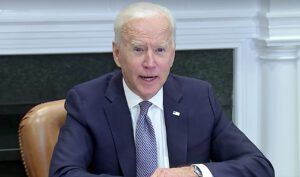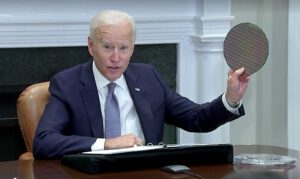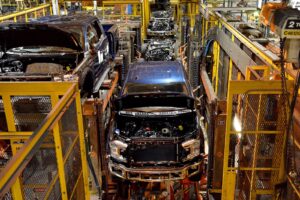
In a meeting with top automotive and technology executives today, President Joe Biden reaffirmed his commitment to protect the supply chain that produces semiconductors for manufacturers across the U.S.
General Motors CEO Mary Barra, Ford CEO Jim Farley and Stellantis CEO Carlos Tavares joined 16 other executives at a meeting Monday to provide the Biden administration — including the president himself — with information about what they need now and in the future.
CEOs from Alphabet, Intel and other executives from Taiwan Semiconductor Manufacturing Co., Samsung, HP and other tech companies also sat in on the meeting during which Biden made his feelings clear about the role semiconductor chips play in the U.S.
“Chips are batteries, broadband … it’s all infrastructure. We need to build the infrastructure of today and not repair the one of yesterday,” he said at the meeting. “The plan I propose will protect our supply chain and revitalize American manufacturing.”
The role of the meeting

Biden noted his $2.3 trillion infrastructure plan has $50 billion set aside to address bolstering semiconductor production in the near term, i.e. incentivize increased production whether through increased efficiency or the construction of additional capacity.
Just prior to the meeting, White House Press Secretary Jen Psaki the goal of the meeting was not necessarily to come up with an answer to the ongoing problem, but to “hear directly from companies about the impact and what would help them most through this period of time.
“So, this isn’t a meeting where we expect a decision or an announcement to come out of, but a part of our ongoing engagement and discussion about how to best address this issue over the longer term, but also over the short term.”
It’s not just automakers that are impacted, Psaki noted, adding White House National Security Adviser Jake Sullivan would be heavily involved in the meeting because a dearth of semiconductors could have national security ramifications.
So what did happen?

Although officials warned to not expect much in terms of immediate help, Intel CEO Pat Gelsinger said the company is talking with the automakers about producing chips for them within six to nine months. Although company officials said last month it would add new capacity and build new factories in the U.S., Gelsinger said the company would get its existing network to provide help sooner for automakers.
“We’re hoping that some of these things can be alleviated, not requiring a three- or four-year factory build, but maybe six months of new products being certified on some of our existing processes,” Gelsinger said. “We’ve begun those engagements already with some of the key components suppliers.”
Without naming specific suppliers, he said that the work could take place at Intel’s factories in Oregon, Arizona, New Mexico, Israel or Ireland, Reuters reported.
Although not as good as getting a surprise load of chips to send to various plants, the automakers did offer the requisite appreciation for being heard.
“General Motors is grateful for the Biden administration’s support of this critical issue impacting the global auto industry,” the company said in a statement. “We look forward to continuing to work with the Administration and members of Congress to address the global shortage and need for near-term prioritization of automotive semiconductors to help U.S. automotive manufacturing resume normal levels of production. We welcome the support of U.S. automotive manufacturing and the 10.3 million jobs the industry supports.”
Stellantis offered a similar statement, which read, “We appreciate the Biden Administration’s engagement on a matter of critical importance to the automotive industry. We look forward to continuing to work together to resolve this short-term supply issue, achieve greater supply chain resiliency in the long term and serve our customers as best as we can.”







